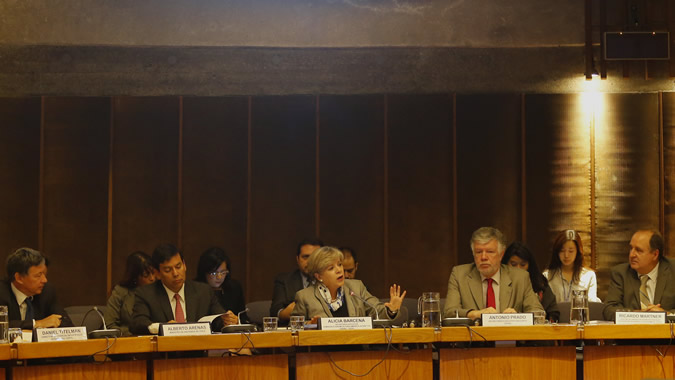Press Release
Latin America and the Caribbean’s taxation systems must be part of a model oriented towards equality of rights and sustainable development, officials contended today at the inauguration of the XXVII Regional Seminar on Fiscal Policy, which is taking place through Wednesday at the headquarters of the Economic Commission for Latin America and the Caribbean (ECLAC) in Santiago, Chile.
The event, inaugurated by Chilean Finance Minister Alberto Arenas and ECLAC’s Executive Secretary, Alicia Bárcena, is organized by the Commission with the sponsorship of the International Monetary Fund (IMF), the World Bank, the Inter-American Development Bank (IDB), and the Organization for Economic Cooperation and Development (OECD). It is supported by the Spanish Agency for International Development Cooperation (AECID) and also received cooperation from Germany’s BMZ-GIZ.
“Fiscal responsibility is a key subject in any country’s economic agenda,” which relates not only to balancing public finances but also to “a State vision for designing public policies,” said Arenas, who praised the space for reflection and exchange of experiences that is created each year during ECLAC’s Regional Seminar on Fiscal Policy.
According to Arenas, Chilean President Michelle Bachelet’s administration aims to tackle inequality from different vantage points to achieve inclusive development. To that end, the greater fiscal income derived from the country’s recently approved tax reform—which increased the tax burden by more than three points of GDP—will be used to finance an educational reform, among other development goals, he said.
The Latin American and Caribbean region faces the challenge of consolidating and preserving the economic and social progress made to date in a context of deceleration and international volatility, and of growing pressure from society for high-quality collective public goods, such as education, health, transportation and security, said ECLAC’s Executive Secretary, Alicia Bárcena.
The third edition of the Fiscal Panorama of Latin America and the Caribbean 2015: Policy Space and Dilemmas will be presented during the seminar. The document is an annual publication by ECLAC that addresses the progress made in the region in terms of public debt and fiscal reforms, as well as pending challenges.
“The challenge is how to orient taxation systems towards greater tax equality,” said ECLAC’s most senior representative, who underlined that at least 15 Latin American countries have carried out fiscal reforms in recent years.
Bárcena said that the average fiscal burden in Latin America represented 21.3% of GDP in 2013, reflecting a seven point increase since 1990. “Nevertheless, a regressive fiscal structure with a strong bias towards indirect taxes is still in place,” she warned. In addition, she said that many countries depend on tax income derived from non-renewable natural resources.
Bárcena emphasized that “a distinctive feature of inequality in the region is that despite the high proportion of income received by the richest 10 percent of households (32% on average), the effective rate of personal income tax paid by this group is just 5.2% on average.”
“In general, the region’s governments have fiscal space to invigorate investment and confront transitory scenarios of deceleration,” said the Executive Secretary, who called on countries to strengthen direct taxation to reduce dependency on taxes coming from a few basic products.



